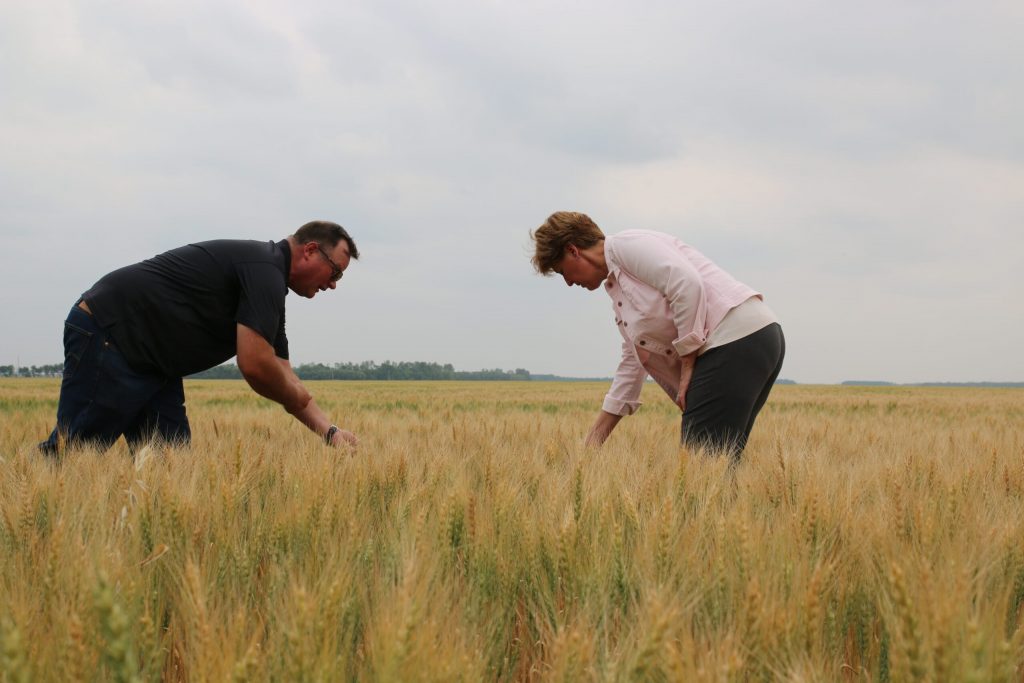Farmers need to make the drought matter – to urbanites

With his voice cracking with emotion, Tyler Fulton described a farm family forced to sell-off their cow herd, a herd produced by years of family effort.

For thousands of farmers, this summer’s drought is destroying not only their family’s hopes and dreams, but also their ability to survive on the farm. Without a cow herd they have no way to make money an provide from themselves.
For crop growers the situation is less immediately extreme, with the crops still struggling in the fields, but a few months from now the same economic crunch will come, as farmers sell what little crop they have and find out how financially viable they are as they try to survive until next year.
This is the reality that Manitoba farmers showed to federal Agriculture Minister Marie-Claude Bibeau on her visit to Manitoba’s drought-stricken Interlake region, and something the farm-raised woman had no trouble understanding herself. Stunted crops, parched soils, scorched pastures and no winter feed growing are pretty clear signs of crisis to agricultural eyes.

But do people outside of farming and rural areas understand what this sort of a widespread environmental disaster means for them, for the greater economy, to Canada?
Right now there aren’t a lot of signs that non-farm and non-rural people see this drought, which stretches across a far wider region than the infamous 1988 drought, as more than a specific and localized situation for farmers and rural communities. As with the devastation of Lytton, B.C., destroyed by a firestorm that followed scorching temperatures, Canadians in general can sympathize with the plight of fellow citizens struck by disaster and can feel for the situation of farmers.
But do they understand how much this epic drought could hit communities far outside of farm country? There’s little today that suggests Canadians understand that farming isn’t just something farmers do, but is one of the prime foundations of the general Canadian economy. If farmers have their incomes crushed, urban areas will be hit as farm families slash their spending, much of which is done in nearby cities.
Rather than speaking to the media out in farm country, even a few miles outside the city, Fulton and Bibeau spoke to reporters in the middle of Winnipeg, in the shadow of the Canadian Museum for Human Rights and beside a giant WINNIPEG sign at The Forks, the city’s tourist Mecca, and a stone’s throw from the local baseball stadium. As an agricultural journalist it annoys me when news events about farming are held in the city, even though I live here too, but as somebody who cares about farmers and hopes their situation isn’t ignored by Canada’s mostly-urban population, I salute the wisdom of holding media events in a location convenient to Winnipeg, provincial and national media outlets. Sadly, events held anywhere outside Winnipeg usually see little media turnout, so any story that needs to be told about farmers isn’t going to be heard if it’s told beyond the Perimeter Highway. Such is the case across Canada, as the country becomes further urbanized and divorced from its farm heritage. Just getting any media attention for farm and agriculture issues these days is a herculean task, but the good turnout from local media at this event shows that it can still be done. (Bibeau toured farms north of Winnipeg and a number of media photographers captured images of the minister and farmers in drought-stricken circumstances.)
But, from scanning the coverage of the event and recent stories from across Canada on the drought situation, it still seems to be perceived as a situation mostly affecting farmers, rather than a national economic problem. If that doesn’t change, farmers will have trouble getting much more sympathy from Ottawa, their provincial capitals, and the Canadian people. Until urbanites realize that what happens on the farm affects them, there won’t likely be anything beyond good wishes for farmers. Making this drought matter to urbanites is essential.
How can farmers achieve that kind of awareness? This visit of the minister helped, drawing significant media interest. But it still seemed very much an agricultural issue affecting farmers. It was the agriculture minister visiting, not the prime minister. I didn’t spot a lot of Winnipeg and Manitoba economic interests at the Winnipeg event, and they certainly weren’t on the tour of the Interlake farms undertaken by Bibeau, but they need to be concerned about the knock-on effects of this drought for the city, provincial and national economies. Without the money generated by agriculture, much of the provincial economy runs on fumes.
That will now be the challenge for farmers’ representatives: how to make this matter to people who don’t farm, who don’t live in rural areas, who don’t have relatives or perhaps even family history on the farm, and who don’t get why they should care much about this drought situation. August is usually a time of little real news, with governments, businesses, schools and much else partially shut for summer holidays. It’s also a good time to get a serious issue into the national news, since there isn’t much else competing. In the fall it’s hard to compete for media attention. Right now it’s easier, so I hope farmers are able to take the rising media interest in this story and make it more relevant for non-farmers, because without much beyond sympathy, many farmers have little to save them.
Source: producer.com

